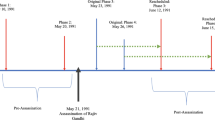Abstract
Deregulation is traditionally endorsed by economists but meets either little reception by politicians or is substantially weakened within the political process. Many papers discuss this aspect, primarily from a rent-seeking aspect. This paper emphasizes the dynamics of deregulation when consumers have sunk costs on the basis of a past regulatory regime. The paper proves first that deregulation should be radical rather than transitory within a conventional, normative framework, even if the consumers act naively and have to bear substantial adjustment costs. As a contrast, a positive model of a vote maximizing politician is introduced that explains why and when actual deregulation proceeds gradually. However, a politician should deregulate at an excessively radical rate at the beginning, if voters have a short memory and/or if demand adjusts sufficiently fast.
Similar content being viewed by others
References
Bailey, E.E. 1986. “Price and Productivity Change following Deregulation: The US Experience.” Economic Journal 96:1–17.
Becker, G.S. 1983. “A Theory of Competition among Pressure Groups for Political Influence.” Quarterly Journal of Economics 98:371–400.
Box, G.E.P., and Jenkins, G.M. 1976. Time Series Analysis. San Francisco: Holden Day.
Chow, G.C. 1989. “Rational versus Adaptive Expectations in Present Value Models.” Review of Economics and Statistics 71:376–384.
Crew, M.A., and Rowley, C.K. 1988a. “Dispelling the Disinterest in Deregulation.” in The Political Economy of Rent-Seeking. edited by Rowley, C.K. Tollison R.D. and G. Tullock, Boston: Kluwer Academic Publishers.
Crew, M.A., and Rowley, C.K. 1988b. “Toward a Public Choice Theory of Monopoly Regulation.” Public Choice 57:49–67.
Cohen, D., and Michel, P. 1988. “How should Control Theory be Used to Calculate a Time-Consistent Government Policy?” Review of Economic Studies 55:263–274.
Downs, A. 1957. An Economic Theory of Democracy. New York: Harper and Row.
Kamien, M.I., and Schwartz, N.L. 1981. Dynamic Optimization: The Calculus of Variations and Optimal Control in Economics and Management. Amsterdam: North Holland.
Kay, J.A., and Thompson, D.J. 1986. “Privatization: A Policy in Search of a Rationale.” Economic Journal 96:18–32.
Kydland, F., and Prescott, E. 1977. “Rules rather than Discretion: The Inconsistency of Optimal Plans.” Journal of Political Economy 85:473–493.
McCormick, R.E., Shugart II, W.F., and Tollison, R.D. 1984. “Disinterest in Deregulation.” American Economic Review 74:1075–1079.
Mueller, D.C. 1989. Public Choice H. Cambridge, MA: Cambridge University Press.
Nordhaus, W.D. 1975. “The Political Business Cycle.” Review of Economic Studies 42:169–190.
Nordhaus, W.D. 1989. “Alternative Approaches to The Political Business Cycle.” Brookings Papers on Economic Activity 2:1989: 1–49.
Peltzman, S. 1976. “Toward a More General Theory of Regulation.” Journal of Law and Economics 19:211–240.
Pindyck, R.S. 1982. “The Optimal Phasing of Phased Deregulation.” Journal of Economic Dynamics and Control 4:281–294.
Stigler, G.J. 1971. “The Theory of Economic Regulation.” Bell Journal of Economics 2:3–21.
Time. 1987. “Rolling Back Regulation.” (July 6).
Time. 1990. “Déjà Voodoo?” (March 26).
von Weizsäcker, C.C. 1965. “Existence of Optimal Programmes of Accumulation for an Infinite Time Horizon.” Review of Economic Studies 32:85–104.
Wirl, F. 1986. “Fuel Conservation under Rational Expectations of the Energy Price Evolution.” Resources and Energy 8:185–197.
Wirl, F. 1990. “Optimal Introduction of TOD Tariffs.” Journal of Economics, 51, 259–271.
Author information
Authors and Affiliations
Rights and permissions
About this article
Cite this article
Wirl, F. Phasing of deregulation: Normative versus positive objectives. J Regul Econ 3, 89–106 (1991). https://doi.org/10.1007/BF00157613
Issue Date:
DOI: https://doi.org/10.1007/BF00157613




